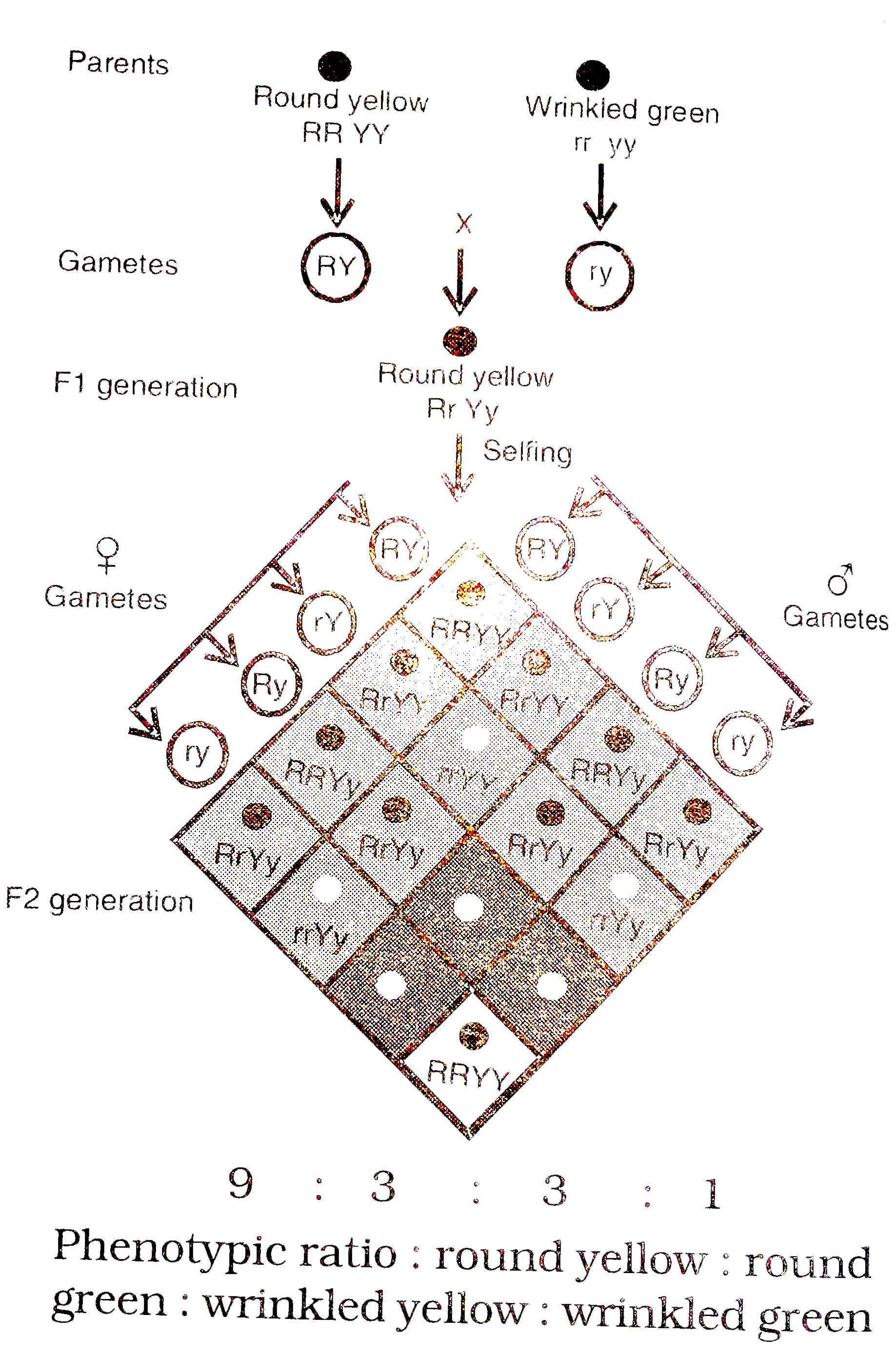(a) Explain Mendel's law of independent assortment by taking a suitable example.
(b) How did Morgan show the deviation in inheritance pattern in Drosophila with respect to this law?
Video Solution
Text Solution
(a) When a cross is made between plants {parents) differing in two or more pairs of contrasting characters, the inheritance of one pair of contrasting character is independent of the other pair of contrasting character. The two characters are transmitted independently in their own patterns. This law can be explained with the help of a dihybrid cross. A cross between two parents which differ in two pairs of contrasting characters is known as dihybrid cross. The cross can be made between true breeding parent plants one having yellow and round seeds (YYRR) and another plant having green and wrinkled seeds (yyrr). This cross is shown here under: To understand the Law of Independent Assortment study the formation of gametes in F, plant (RrYy). Consider the segregation of one pair of genes R and r 50% of gametes have the gene R and other 50% have r. In addition each gamete should also have the allele Y or y. We can see segregation of 50% Rand 50% r is independent from the segregation of 50% Y and 50% y. Therefore. 50% of r bearing gametes have Y and the other 50% y. Similarly,have Y and other 50% have y. Thus four different kinds If yy of gametes, ie.. RY. Ry, rY. ry are formed
(b) Morgan's experiment on Drosophila melanogaster (tiny fruit flies) Morgan hybridised yellow bodiedwhite eyed female flies with brown bodied-red eyed males and inter-crossed their F1 progeny. He observed that the two genes did not segregate independently of one another and the F2 ratio deviated very significantly 1from 9:3 :3: 1 ratio. Morgan knew that the genes were located on the X -chromosome and saw quickly that when the two genes in a dihybrid cross were situated on the same chromosome, the proportion green of parental gene combinations were much higher than the non-parental combinations Morgan attributed this to linkage or physical association of genes on a chromosome. The total number of genes present on one chromosome constitute a linkage-group. The genes are called linked genes.

|
Topper's Solved these Questions
- GENETICS AND EVOLUTION BOOK - TRUEMAN BIOLOGYCHAPTER - GENETICS AND EVOLUTION EXERCISE - SECTION-A
34 Videos
- GENETICS AND EVOLUTION BOOK - TRUEMAN BIOLOGYCHAPTER - GENETICS AND EVOLUTION EXERCISE - SECTION-C
45 Videos
- GeneticsBOOK - TRUEMAN BIOLOGYCHAPTER - GeneticsEXERCISE - ASSERTION AND REASON
123 Videos
- HUMAN HEALTH AND DISEASEBOOK - TRUEMAN BIOLOGYCHAPTER - HUMAN HEALTH AND DISEASEEXERCISE - MULTIPLE CHOICE QUESTIONS
213 Videos
Similar Questions
Knowledge Check
Mendel's law of independent assortment is applicable for:
Aall linked genes onlyBall genes in all organismCall genes of pea plant onlyDall non-linked genes onlyMendel's law of independent assortment is applicable for
AAll genes in all organismBAll genes of pea plant onlyCAll linked genes onlyDAll non-linked genes onlyMendel's law of independent assortment can be demonstrated by
ATest crossBBack crossCMonohybrid crossDDihybrid cross
What is does Mendel's law of independent assortment state?
View SolutionExplain "the law of independent assortment'' with a suitable example.
View SolutionLAW OF INDEPENDENT ASSORTMENT
View SolutionMendel's law of independent assortant can be domostrated by:
View SolutionMendel's third law of independent assortment can be demonstrated by
View Solution